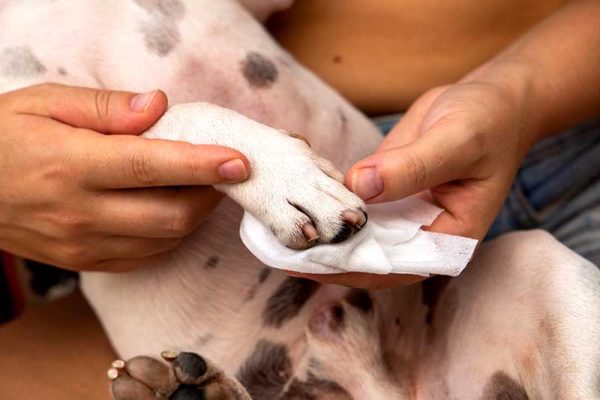Carprofen is an anti-inflammatory drug for veterinary use and is administered to dogs to reduce the inflammation and pain associated with musculoskeletal disorders and degenerative joint processes. This medication can also be used post-operatively for pain control.
Carprofen should not be administered to pregnant and lactating females. Side effects may include vomiting, loose/dark stools, diarrhea, or gastrointestinal bleeding (in rare cases). In general, the clinical signs associated with side effects are transient, disappearing once the treatment is interrupted.
If adverse reactions occur, you should stop the administration and notify your vet.

What Is Carprofen?
Carprofen is a non-steroidal anti-inflammatory drug used to reduce inflammation and pain caused by musculoskeletal or degenerative joint diseases.
As a mechanism of action, carprofen inhibits cyclooxygenase enzymes, which in turn, inhibit the release of prostaglandins, hormone-like substances involved in several processes in the body, including inflammation and fever. As a result, carprofen can also lower fever.
- Osteoarthritis
- Intervertebral disk disease (IVDD)
- Elbow dysplasia
- Hip dysplasia
Carprofen can also be used after surgery to relieve pain. You can find it under several names on the market, including:
- Aventicarp®
- Canidryl®
- Carpox®
- Carprodyl®
- Carprieve®
- Levafen®
- Norocarp®
- Novox®
- Quellin®
- Rimadyl®
- Rimifin®
- Rovera®
- Rycarfa®
- Tergive®
- Vetprofen®
- Zinecarp®
This medication should be stored at room temperature (though not above 77°F/25°C) in a dry, dark place. It should not be used after the expiration date marked on the packaging. Any split tablet fragments should be discarded after 24 hours.
Also, this medication should be stored away from your dog’s prying nose because it is palatable, and your pet could accidentally consume it. Contact a veterinarian if you suspect that your dog has ingested more carprofen than the recommended dose.
How Is Carprofen Given?

This medicine is issued only based on a prescription from the veterinarian. Carprofen comes in the form of tablets of different concentrations, both for small and large breeds. It should be administered with food to avoid stomach upsets.
The recommended dose of carprofen is 2 mg/lb. (4.4 mg/kg) of bodyweight daily (in a single dose or divided into two doses every 12 hours). However, the veterinarian can recommend a higher or lower dose for your dog, depending on their condition.
The effects of carprofen usually appear 1–2 hours after administration.
Before giving any new medication to your dog, we recommend you consult a veterinarian for the best advice on which would be the best treatment for your pup.
If you need to speak with a vet but can't get to one, head over to PangoVet. It's our online service where you can talk to a vet online and get the advice you need for your dog — all at an affordable price!

What Happens If You Miss a Dose?
As with many drugs, if you miss a dose, do not give your dog a double dose. Give your dog the dose when you remember or if the time is closer to the next dose, give that one, then go back to your regular dosing schedule. Administering two doses at once may lead to adverse effects.
Regarding overdose, there were no toxic signs observed when dogs were treated with carprofen in doses of:
- 6 mg/kg twice daily for 7 days
- 6 mg/kg once a day, 7 days
There is no specific antidote for carprofen overdose. In this case, the vet will institute supportive therapy.
Since the tablets are pleasant to taste, it is recommended to store them in a safe place. In case of ingestion of large quantities, severe adverse reactions may occur. Contact your veterinarian if you suspect that your dog has ingested more tablets than the recommended dose.

Potential Side Effects of Carprofen

The side effects of carprofen administration in dogs can be mild or severe. Mild side effects may include the following clinical signs:
- Mild vomiting
- Constipation
- Diarrhea
- Soft stools
- Lack of appetite
- Fatigue
Severe side effects are rare and usually occur in sensitive dogs and/or at doses that are too high. They can cause liver, kidney, and/or gastrointestinal lesions, which can lead to the following clinical signs:
- Severe vomiting, sometimes with blood
- Gastrointestinal hemorrhage
- Black, tarry stools (color due to the digested blood that comes from gastrointestinal bleeding)
- Yellow mucous membranes and/or skin (jaundice)
- Increasing water intake
- Frequent urination
- Lack of appetite
- Severe lethargy
Sometimes, neurological signs and skin reactions may also occur, which can include:
- Paralysis
- Wobbly walking
- Aggressivity
- Restlessness
- Seizures
- Disorientation
- Itching
- Hair loss
- Allergic reactions
- Swelling of the face
In some cases, carprofen can affect blood tests, giving modified values for the following parameters:
- Thyroid hormones
- Blood cell count
- Bleeding time
- Potassium
- Liver enzymes
- Kidneys
For these reasons, it is recommended to administer carprofen with caution to dogs suffering from liver and kidney diseases. It is recommended not to administer carprofen simultaneously with anticoagulants.
Administering carprofen to elderly dogs may involve additional risks. If this cannot be avoided, elderly dogs will require low doses and careful clinical management. You should also avoid administering it to dehydrated, hypovolemic, or hypotensive dogs, as there is an increased risk of renal toxicity.
Frequently Asked Questions (FAQ)
Is Carprofen the Same as Ibuprofen?
No, carprofen is not the same as ibuprofen, though both are non-steroidal anti-inflammatory drugs used to reduce inflammation and pain. Carprofen is used only in dogs, while ibuprofen is recommended for humans. Dogs should not receive ibuprofen, as it can be toxic to them. Clinical signs of ibuprofen poisoning in dogs may include weakness, gastrointestinal bleeding, black tarry stools, vomiting (sometimes with blood), abdominal pain, increased thirst and urination, and lethargy.
Can I Give My Dog Carprofen Every Day?

Depending on your dog’s medical condition, your vet may prescribe carprofen for a short period (a few days/weeks) or the long term. If your dog has just undergone surgery, your veterinarian may recommend giving your pet carprofen for a few days or weeks. In chronic conditions, such as osteoarthritis, dogs can take carprofen for the long term, but their kidney and liver parameters should be checked with regular blood work (every 2–4 weeks).

Final Thoughts
Carprofen is a non-steroidal anti-inflammatory drug that is administered to dogs to reduce pain and inflammation. It is mainly administered for musculoskeletal and degenerative joint diseases (osteoarthritis, IVDD, elbow or hip dysplasia) but also post-operatively to control pain. Carprofen can cause side effects, which may include vomiting, diarrhea, soft stools (black, sometimes tarry), lethargy, or lack of appetite. In rare cases, severe adverse reactions may also occur and can include neurological signs, gastrointestinal bleeding, severe lethargy, etc. When the side effects are mild, they should resolve on their own after the treatment is stopped.
Featured Image Credit: Carprofen molecule ball (Jynto, CC0, via Wikimedia Commons, CC0 1.0 Universal Public Domain Dedication)


















